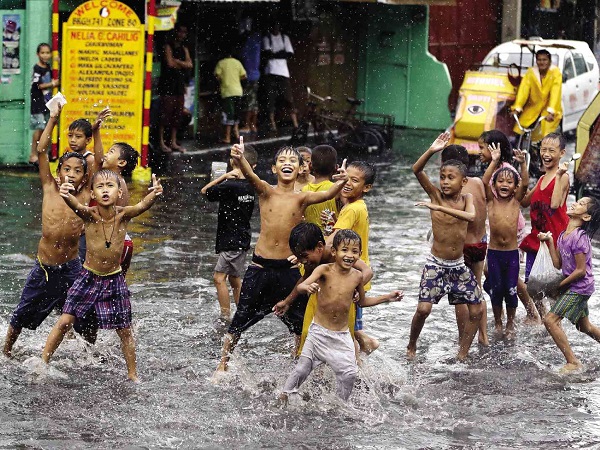Lack of sanitation, clean water killing kids, says Unicef

SUDDEN SUMMER RAIN Children frolic on a flooded street in Manila on Friday, following a sudden downpour that ironically occurred as the weather bureau declared the onset of summer this week. The thunderstorm was caused by the convergence of winds from the Pacific and the northeast. It was quite a timely reminder that the world was marking World Water Day. AP/BULLIT MARQUEZ
MANILA, Philippines—The United Nations Children’s Fund (Unicef) has called on governments, civil society groups and citizens of nations to remember the children as World Water Day was marked last Friday.
Globally, an estimated 2,000 children under the age of five die every day from diarrheal diseases and, of these, some 1,800 deaths are linked to water, sanitation and hygiene lack, Unicef said.
“Sometimes we focus so much on the big numbers that we fail to see the human tragedies that underlie each statistic,” said Sanjay Wijesekera, global head of Unicef’s water, sanitation and hygiene program.
“If 90 school buses filled with kindergartners were to crash every day, with no survivors, the world would take notice. But this is precisely what is happening every single day because of poor water, sanitation and hygiene,” Wijesekera said.
Article continues after this advertisement
Still too many deaths
Article continues after this advertisementAlmost 90 percent of child deaths from diarrheal diseases are directly linked to contaminated water, lack of sanitation and inadequate hygiene. But despite a burgeoning global population, these deaths have dropped significantly in the last decade, from 1.2 million in 2000 to about 760,000 in 2011.
That is still too many, Unicef said.
Unicef child mortality data showed that about half of under-five deaths occurred in only five countries: India, Nigeria, Congo, Pakistan and China.
Of the 783 million people worldwide without improved drinking water, 119 million are in China, 97 million in India, 66 million in Nigeria, 36 million in Congo and 15 million in Pakistan.
The figures for sanitation are even bleaker. Those without improved sanitation in those countries are: India, 814 million; China, 477 million; Nigeria, 109 million; Pakistan, 91 million, and Congo, 50 million.
Millennium goal in jeopardy
In the Philippines, an estimated 26 percent of the people do not have improved sanitation, translating to more than 24 million persons, according to Unicef and the World Health Organization. Almost 8 million Filipinos defecate in the open, the third highest total in the Asia Pacific, the two UN agencies said.
“Under the leadership of the Department of Health, the Philippines has made significant advances in sanitation over the last 20 years. However, we are in jeopardy of not reaching the 2015 Millennium Development Goal on Sanitation because the poorest 20 percent of the population are sliding,” said Tim Grieve, chief of water, sanitation and hygiene of Unicef Philippines.
Grieve said that in the last 20 years, the poorest 20 percent of the rural Philippine population went from 36 percent open defecation to a staggering 48 percent open defecation. Poor sanitation and poverty go hand in hand, and the rural poor are four times more likely to practice open defecation than in urban areas, Grieve said.